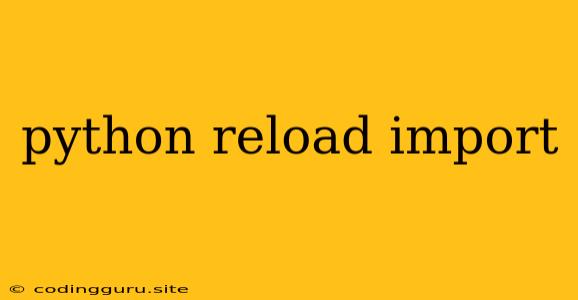Python Reload Import: How to Refresh Your Modules in Real-Time
In the dynamic world of Python programming, you'll often find yourself working with modules that need to be updated or modified during runtime. This can be especially useful when you're developing or debugging your code, and you want to see the effects of changes immediately without restarting your entire program. But how can you achieve this? The answer lies in the power of reload and import in Python.
What is Module Reloading?
Think of a Python module as a collection of functions, classes, and variables that you can access and use in your code. When you import a module, Python loads it into memory and makes its contents available for you to utilize. However, once loaded, the module remains static - any changes you make to the module's source code won't reflect in your program unless you restart it.
This is where module reloading comes in. Reloading allows you to refresh the module's content in memory, incorporating any changes you've made to its source code.
Understanding reload and import
import is your primary tool for bringing modules into your Python environment. When you use import, Python searches for the specified module in your system's path and loads it into memory.
reload, on the other hand, comes into play after you've already imported a module. It acts like a "refresh" button, overwriting the existing module's contents with the latest version from its source file.
How to Use reload in Python
To use reload, you'll need to import the imp module, which provides functions for working with imported modules. Here's a step-by-step guide:
-
Import the
impmodule:import imp -
Import the module you want to reload:
import my_module -
Reload the module:
imp.reload(my_module)
Now, any changes you made to my_module.py will be reflected in your running program.
Example: Reloading a Module
Let's illustrate with a simple example. Assume you have a file called my_module.py with the following code:
def greet(name):
return f"Hello, {name}!"
Now, create another Python file, let's call it main.py, and try using my_module:
import my_module
print(my_module.greet("Alice"))
Running main.py will output:
Hello, Alice!
Now, let's say you modify my_module.py and change the greeting to:
def greet(name):
return f"Greetings, {name}!"
Running main.py again will still print "Hello, Alice!" because the original version of my_module is still loaded in memory. To see the updated greeting, we need to reload my_module:
import imp
import my_module
# ... modify my_module.py
imp.reload(my_module)
print(my_module.greet("Alice"))
Now, running main.py will output:
Greetings, Alice!
When and Why to Use reload
reload is a powerful tool, but it's essential to use it strategically:
- Development & Debugging:
reloadis a great aid during development and debugging, allowing you to test code changes without restarting your entire program. - Interactive Environments:
reloadis particularly useful in interactive environments like Jupyter Notebooks where you can easily make changes and see the results immediately. - Plugin Systems: In scenarios where you have a plugin system, you might want to use
reloadto dynamically update plugins without restarting the main application.
Considerations and Alternatives
While reload offers flexibility, it's not always the ideal solution:
- Side Effects: Be mindful of potential side effects when reloading modules. If a module's initialization code has already executed, reloading it may cause unexpected behavior.
- Complex Dependencies: If a module has intricate dependencies on other modules, reloading it might not always update those dependencies correctly.
- Alternatives: In some cases, consider alternative solutions like using modules with a more modular structure or leveraging tools like
reload_module()from theimportlibmodule, which offers more granular control over the reloading process.
Conclusion
reload in Python allows you to refresh the contents of a module dynamically, enabling you to incorporate changes without restarting your program. It's a valuable tool for development, debugging, and interactive environments. However, exercise caution with potential side effects and consider alternative solutions when necessary. Understanding reload is essential for enhancing your Python coding efficiency and productivity.
